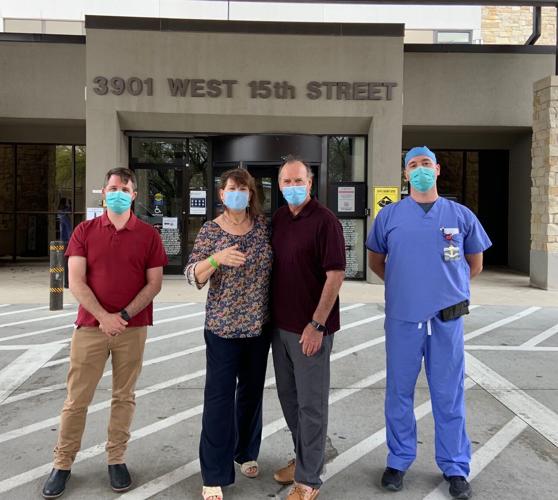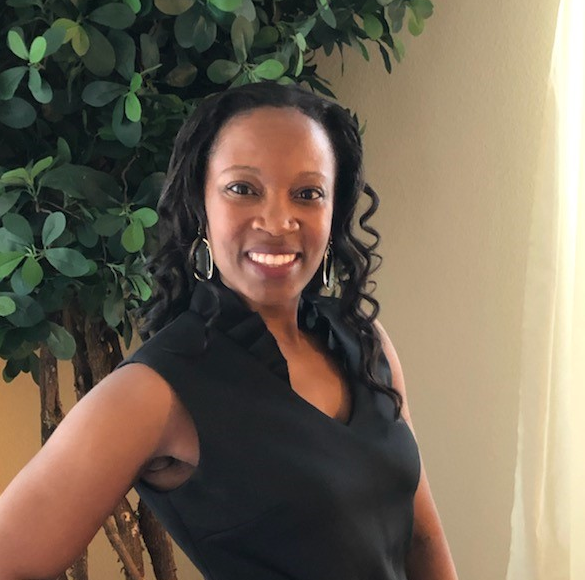Tyler Morning Telegraph
By Zak Wellerman May 12, 2022
Just over a year ago, Gary Olive was hospitalized with COVID-19 in Tyler for three days, but his health then declined rapidly. He was soon on life support without the ability to breathe on his own.
Thanks to highly advanced life-saving treatment at Medical City Plano, he was able to return last week to show his gratitude to the physicians who aided him in recovery.
Olive, 68, and his wife, Karen, were among the first Tyler residents to be diagnosed with COVID-19 in March last year. Olive said he was patient zero and his wife was patient number one.
At Medical City, physicians used an artificial life-support known as extracorporeal membrane oxygenation, or ECMO, to help Olive. This was the first time for ECMO to be tried on a COVID-19 patient in Texas.
“To me a simple thank you feels inadequate,” Olive said. “I am thankful to my doctors for their willingness to admit me, for the risk they took, and for the resources they choose to use on me. I am thankful to all of these health care pioneers who saved my life.”
Through this treatment, the blood is pumped outside of the body to a heart-lung machine that removes carbon dioxide and sends oxygen-filled blood back into the tissues. The heart and lungs can rest and heal using the ECMO program.
“We came back just to say hello, to let the doctors and nurses see me and see where I stood after a year since being admitted,” Olive said. “It’s as emotional as would be expected. The care that I received here obviously saved my life and so to come back to say thank you is an emotional time but it’s been wonderful.”
He spent almost a month at the Plano hospital’s COVID-19 ICU before he was discharged to long-term rehabilitation center and then to another inpatient rehabilitation center in Tyler.
Olive said he doesn’t really remember many things after he was hospitalized.
“It wasn’t long before I was put on a respirator, and my wife was on a respirator soon after,” he said. “I was pretty sick and I went down pretty quickly. So I don’t remember much.”
He was in the hospital for nine weeks, and he had slow recovery along with some time in rehab. After recovering, Olive said he still has some residual issues, including sore muscles, joint pain, brain fog and being tired at times.
“I think it’s well known for a lot of severe COVID patients to have long term effects,” he said.
Following the trials of his COVID-19 diagnosis, Gary and Karen Olive are back home together with their family.
“I feel so blessed and know that this extra time is a gift from God,” Olive said.
He added he wouldn’t have survived if the hospital staff didn’t put him on the ECMO machine.
“I’m very thankful for Medical City Plano for their willingness to go to extremes and use the resources they have to save my life,” Olive said.
Dr. Crescens Pellecchia, director of Medical City Plano’s ECMO program, said Olive’s treatment helped show that this technology could be used at other facilities to help COVID-19 patients, including severe cases like Olive.
“He couldn’t breath on his own. His lungs were so sick that we had to be put on a machine that basically bypassed the lung to keep him alive,” Pellecchia said. “At the time, there were no other facilities or institutions in Texas that were doing it and he is the first patient to survive, which also sort of paved the way for us that we knew we could get these COVID patients through it with these special technology. It wasn’t until after this case that more institutions started doing this for their COVID patients. “
He said a great program and supportive staff and administration allowed physicians at the hospital to help Olive.
“A lot of people took a chance on both the physicians, our nursing staff, our ECMO specialists, our administration here,” Pellecchia said. “We just knew we had to do something to try to save Mr. Olive.”
Dr. Scott Van Poppel, critical care director at Medical City Plano, called using the ECMO treatment on Olive a “game changer.”
“Nobody thought this could be done or nobody else knew how this was going to go. The path changed because that point in the course of the disease nobody knew,” Van Poppel said. “We had high numbers of mortality throughout the country, throughout the world and nobody really knew what to do. At this point, when we put Gary on ECMO and it was successful, the rest of the institutions around us said ‘they did it, when can do it.’”
Van Poppel added that was a “joyous occasion” to see Olive return to thank his doctors and nurses.
“As a critical care doctor and a critical care nurse and practitioner, we don’t get to meet our patients. We can take care of them for four weeks and you never truly get to meet them because they’re unconscious and so sick,” he said. “But to have somebody come back to us and say ‘hi’ and able to hold a decent conversation, this is why we do what we do. It emphasizes why we struggle, why we work every day so hard especially during the COVID pandemic.”
Studies later published in the medical journal, The Lancet, along with other publications, showed ECMO could be used in eligible patients when a ventilator is no longer sufficient for life-support. Due to the technology and skill required to use it, only a few hundred hospitals in the country can use ECMO.
“I was the first in Texas to be on an ECMO machine,” Olive said. “The doctors here made the decision to take a risk and to put me into that program to take their time and use the resources of this hospital to put me in the ECMO program. I describe that to friends and it’s a very meaningful place to me.”

